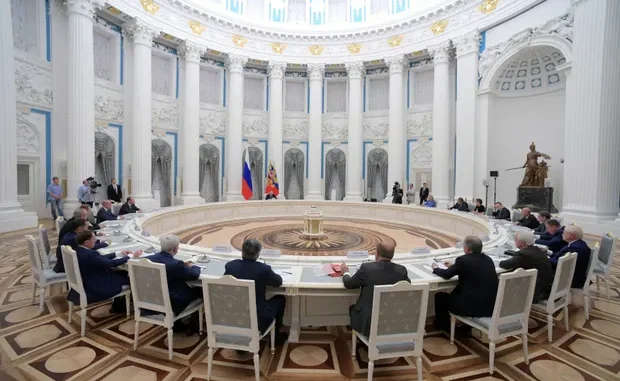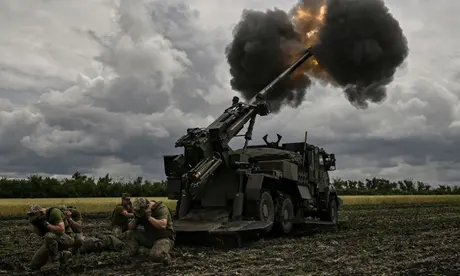‘Everyone should know that, by and large, we haven’t started anything yet in earnest,’ Russian president tells Kremlin parliamentary leaders
By Samantha Lock, GUARDIAN and agencies
Vladimir Putin has issued one of his most ominous warnings yet, claiming Moscow has barely started its campaign in Ukraine and daring the west to try to defeat it on the battlefield.
Speaking at a meeting with parliamentary leaders on Thursday, the Russian president said the prospects for any negotiation would grow dimmer the longer the conflict dragged on.
“Everyone should know that, by and large, we haven’t started anything yet in earnest,” he said. “At the same time, we don’t reject peace talks. But those who reject them should know that the further it goes, the harder it will be for them to negotiate with us.”
Putin also accused Ukraine’s western allies of fuelling hostilities, charging that “the west wants to fight us until the last Ukrainian” and that they were welcome to try, but it would only bring tragedy for Ukraine.
“Today we hear that they want to defeat us on the battlefield. What can you say – let them try,” he said.
“We have heard many times that the west wants to fight us to the last Ukrainian. This is a tragedy for the Ukrainian people, but it seems that everything is heading towards this.”
The Russian leader also raged against “totalitarian liberalism” that he said the west had sought to impose on the entire world and reaffirmed his long-held claim that the west is using the conflict in Ukraine to try to isolate and weaken Russia.
“They simply don’t need such a country as Russia,” Putin said. “This is why they have used terrorism, separatism and internal destructive forces in our country.”
He charged that western sanctions against Russia had failed to achieve their goal of “sowing division and strife in our society and demoralising our people”. However, he conceded that sanctions were creating difficulties, “but not at all what the initiators of the economic blitzkrieg against Russia were counting on”.
“The course of history is unstoppable, and attempts by the collective west to enforce its version of the global order are doomed to fail,” Putin said.

Ukraine’s chief negotiator, Mykhailo Podolyak, dismissed Putin’s notion of a plan directed against Russia by the west.
“There is no ‘collective west’ plan. Only a specific z-army which entered sovereign Ukraine, shelling cities and killing civilians,” Podolyak tweeted. “Everything else is a primitive propaganda.”
Russian parliamentary leaders responded to Putin’s comments and one, Sergei Mironov of the A Just Russia party, encouraged him to set up a special agency to facilitate the integration of occupied Ukrainian territories into Russia – an idea Putin promised to discuss.
Russian prosecutors also called for prison sentences on Thursday for a prominent opposition activist and for a Moscow city council member who spoke up against Russia’s actions in Ukraine.
 <
<Ukraine forces finally seeing impact of western arms, says Zelenskiy
Alexei Gorinov, who was detained in April, is the first Russian elected representative to face prison for spreading “knowingly false information” about the Russian army, a charge that carries a maximum sentence of 15 years’ jail.
Gorinov criticised Moscow’s military actions in Ukraine at a council meeting in March, a recording of which is now available on YouTube. The video shows him voicing skepticism over a planned children’s art competition in his constituency while “every day children are dying” in Ukraine. A Russian prosecutor has asked for a seven-year sentence.
Prosecutors have also asked that Andrei Pivovarov, former head of the Open Russia organisation, be given a five-year sentence for “directing an undesirable organisation”, according to his lawyer, Sergei Badamshin.
Pivovarov was pulled off a Warsaw-bound plane at St Petersburg’s airport just before takeoff in May last year. He was taken to the southern city of Krasnodar, where he was accused of supporting a local candidate on behalf of an “undesirable” organisation. The criminal charge is based on his social media posts supporting independent candidates in Krasnodar’s municipal elections.
Since invading Ukraine on 24 February, Russian forces have captured large swathes of the country, most recently seizing the eastern region of Luhansk.
But their progress has been far slower than many analysts predicted, and after failing to capture Kyiv and other big cities in Ukraine’s north-east early in the campaign, Moscow’s forces shifted their focus to the eastern industrial heartland of Donbas.
Earlier this week, the Russian military claimed control of Luhansk province, one of the two that make up Donbas, and is preparing to press its offensive into neighbouring Donetsk.
I write from Ukraine, where I’ve spent much of the past six months, reporting on the build-up to the conflict and the grim reality of war. It has been the most intense time of my 30-year career. In December I visited the trenches outside Donetsk with the Ukrainian army; in January I went to Mariupol and drove along the coast to Crimea; on 24 February I was with other colleagues in the Ukrainian capital as the first Russian bombs fell.
This is the biggest war in Europe since 1945. It is, for Ukrainians, an existential struggle against a new but familiar Russian imperialism. Our team of reporters and editors intend to cover this war for as long as it lasts, however expensive that may prove to be. We are committed to telling the human stories of those caught up in war, as well as the international dimension. But we can’t do this without the support of Guardian readers. It is your passion, engagement and financial contributions which underpin our independent journalism and make it possible for us to report from places like Ukraine.
If you are able to help with a monthly or single contribution it will boost our resources and enhance our ability to report the truth about what is happening in this terrible conflict.



Am I wrong in assuming that Russia’s increased revenue for its energy exports far exceeds the cost of rebuilding eastern Ukraine.
@Ted
Oh, and also recall Serbia’s success at the polls while opposing NATO’s anti-Russian policy as well.
As the West has given a new meaning to the phrase “the great bank heist”, they have dishonored themselves and greatly impaired the very system by which they brought that dishonor on themselves. It wasn’t just stupid, it was counter productive, and yet they persist in continuing the policy with ever increasing levels of intensity. Now preferring to set price caps on Russian oil, as if Russia will choose to sell her oil to the West for less than the market will bear simply to benefit the West – these fools actually believe that Russia will play the same foolish game of Shoot Myself in the Wallet that they have forced upon themselves. Given the pack of child minded leaders among the West, it might be accepted as par for the course, but Putin is no fool, he is not insane, he is quite capable, and the West is about to pay a very steep price, particularly Europe, and particularly eastern Europe and particularly Germany. As goes Germany, goes the Eurozone, and Germany is going to be boxing their industries due to these redoubled blunders. So yes, as long as this list of political defeats and triumphs, respectively, stands now, it will lengthen, with those foolish enough to support the NATO nonsense bearing most of the economic baggage and political upsets, and those opposing it fairing far better for their due diligence. Leadership bears a consequence as to its quality, and poor leadership only provides a terrible cost to all involved.
@Peloni
You can add to the list Hungary’s independence under Orban, the farmers protests and the fall of Sri Lanka.
And Putin is just beginning to withhold food and energy supplies to Europe.
Now, the PM of England, Estonia and Italy have resigned, while the govts of Bulgaria and France and Slovakia(I think) have had political setbacks, all in the past couple of months. How ironic will it be when all the govts of NATO, themselves, are faced with not only a boomerang of their sanctions effort against Russia but also of their hopes for a regime change in Russia. It is a sad silly fact that this may well be the eventual consequence of the refusal to accept that the sanctions war is harming the West far more significantly than it is Russia. In fact, I can not forsee the peoples of Europe ignoring their new economic plight as their savings are drained and their economy is destroyed and their industry is forced into bankruptcy due to non-competitive price structuring due to their self inflicted energy costs. If they are so determined to use Ukraine as a Russian grist mill, they do not have to afflict their people, their economies and their industries with this clearly failed policy of making everything more expensive. So let them fall, one by one, and then let us see if this insanity is so well baked into the European political fabric that the replacement govts will persist with these same failing policies. It really wouldn’t surprise me in the least. It might surprise the respective publics, though.
@Retired 22. The belief that inernational bankers have caused all the wars and problems in the world has long been a staple of anti-semitic legend and propaganda. Actually, most bankers have very little interest in international politics. They are just interested in making money, and the only political activity they lobby for is government support for their institutions (loans from the “Fed,” etc.)
Raphael
Russia has ALWAYS resented Ukraine separating and becoming independent. Russia has always regarded Ukraine as part of Russia and has never lost that attitude. Tjhis is common knowledge and even recently mentioned in articles on the subject . After the Soviet State disintegrated, Russia , as you well know walked back into several of thr “separated” new states and pulled them back into the mainly Russia body. If not actually absorbed, they are grovelling client states.
SEYMOUR\
Why not call them just “moronic”. The “oxy” is not suitable in this instance,
Re the article from the Mail, quoted above: So much for global warming.
Statements like this are pure propaganda. It pre-supposes that Russia has imperial goals…something that the west seems to enjoy repeating. This is a false accusation, however. Russia is not trying to gain territory. It’s trying to guarantee safety for itself and its people. This unfortunately had to extend to Ukraine, where ethnic Russians were being oppressed. If territorial gains result, sobeit.
There have been more rumours about Putins cancer than sightings of Elvis. I rather doubt it just like rumours of a coup. I also don’t think he could care less about his “legacy” which is a western media invention for narcissistic western “leaders”. As for totalitarianism as he put it the bigger concern is “liberal totalitarianism” which, if you haven’t been asleep” is what’s been enveloping us, thank you oxymoronic Liberals in Canada and Democrats in US
This business in Ukraine is just A sideline for the lo info crowd.
Ukraine is just a pawn for the EU Globalist Bankers.
The Russians have already won the real financial battle by surviving the initial sanctions attacks from London & Brussels
The Russians have now countered with a Gold backed financial system that is now destroying the EU bankers fiat system.
Why the sudden aggressiveness from Putin? Is the rumor true that he has cancer? That is one explanation for his wanting to make a legacy for himself, if he believes he doesn’t have much time left.But he won’t be remembered well by the free world, as he’ll be remembered as a corrupt and barbarian totalitarian. He denies this while imprisoning Russians who only spoke their minds; Apparently there is little freedom left in Russia due to the present totalitarian regime.
There are no moral or immoral big powers only big powers.